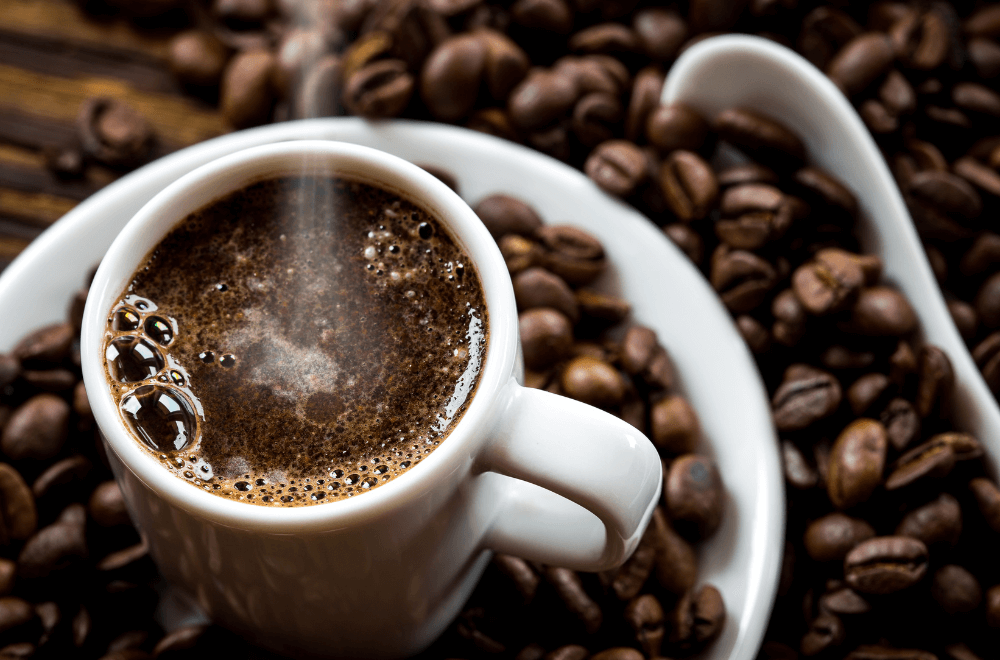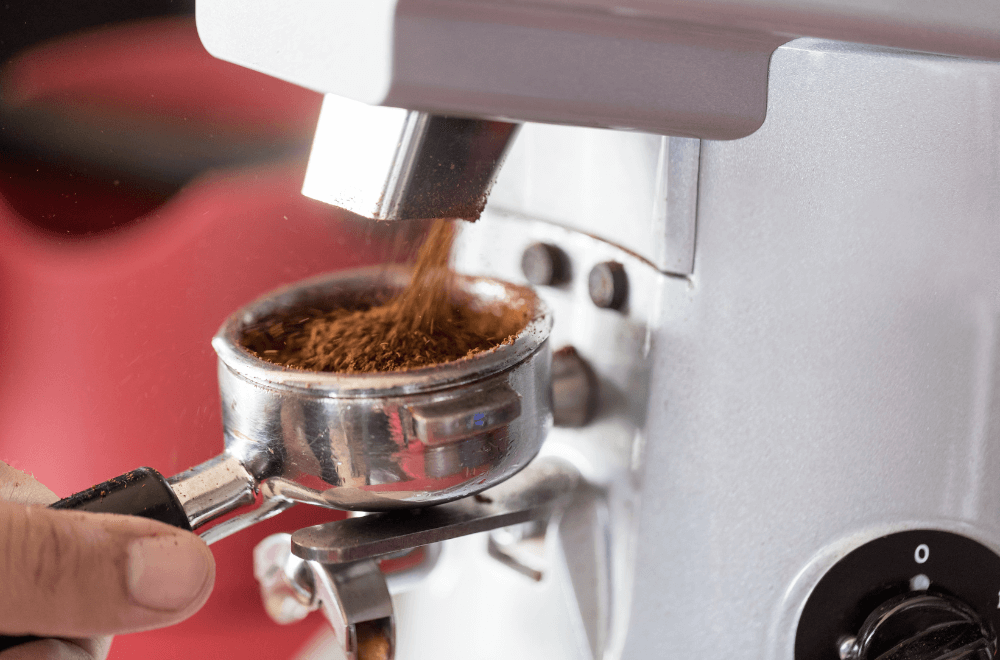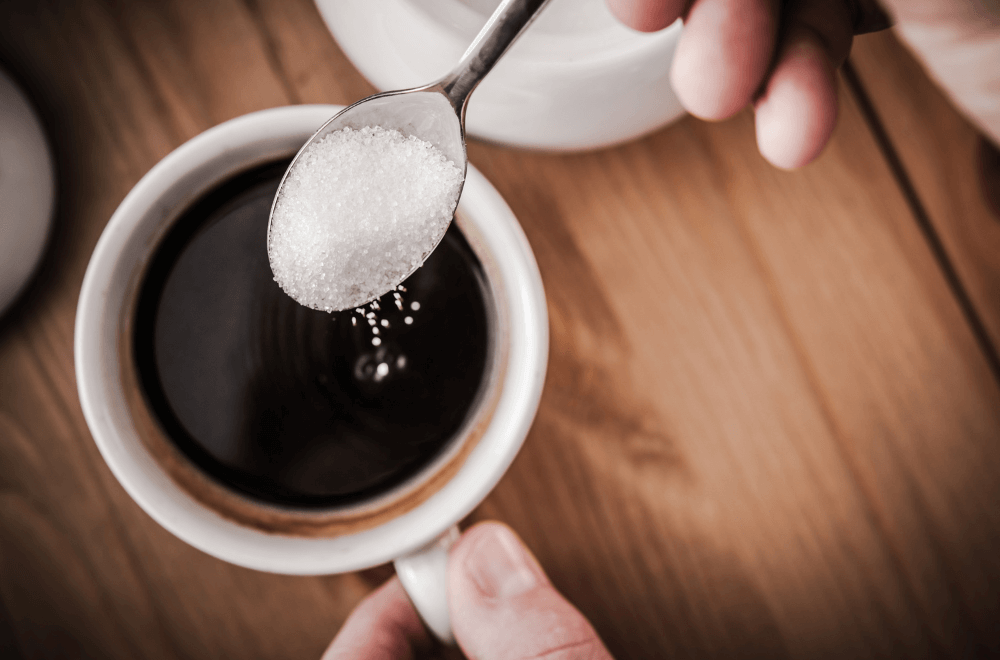Looking for a way to make coffee less bitter? If so, you have arrived at the right article, we have tips for the coffee drinker who brew with little less bite.

You don’t have to settle for coffee that tastes too bitter for your taste buds. Instead, you can change the coffee bean and the brewing method and add other elements to the brewing process to ensure you get a good coffee that sits perfectly on your palette.
If you use cheap, low-quality, or stale coffee beans, it doesn’t matter how good your brewing method is; you will never get a good cup of coffee. That being said, if you buy high-quality specialty coffee and the end result still doesn’t taste right, then there’s a good chance that something is wrong with your brew method.
It could be a case of using too much water, brewing at the wrong temperature, or simply storing your coffee beans in the wrong place. Let’s dig a little deeper into how bitter coffee happens and what you can do to fix it.
1. Avoid Over-Extraction
The most common cause of coffee’s bitterness is over-extraction, which essentially means that the coffee is over-brewed, adding flavors that you didn’t intend to put into the cup. It’s an easy mistake to make and one that coffee novices know all too well.
There are a few reasons over-brewing can happen. One of the most common is that the coffee is brewed for too long. When it comes to timing, there is a sweet spot for different brewing methods, and if you miss it, too many flavors are extracted, causing bitterness, amongst other things.
There’s not too much you can do about that when using a drip coffee maker, but when you’re using a French press and don’t push the filter down soon enough, the coffee often has a perceived bitterness.
Simply pushing the plunger a little earlier will help you avoid over-extracted coffee. With coffee machines where you can’t control the water flow, tip #2 will help you out.
2. Don’t Grind the Beans Too Finely

Another cause of bitterness that coffee lovers should avoid is grinding the coffee grounds too finely. The smaller the coffee grind, the faster the flavor is extracted. So, resist the temptation to use that grinder for any longer than it’s needed.
That’s why espresso uses fine grounds and cold brew uses coarse. If your ground coffee is too fine, it will release the good flavors too fast and start to give off the things that make it have that bitter flavor. It’s a simple change, but one that can make all the difference in the coffee’s flavor.
Larger beans let the water drain more quickly and don’t release flavor and bitter compounds as quickly, shortening the overall brewing time. Grind size is an element of the coffee-making process that you will have to experiment with to get right, so don’t worry if you don’t ace it the first time. Even the more experienced coffee enthusiasts get it wrong now and again.
3. Use Water… That’s The Right Temperature
You can also over-extract coffee by using water that’s too hot. Thus, avoid that boiling water and get a more balanced cup of coffee. The ideal temperature is between 195 and 205 degrees F.
The higher the temperature goes beyond 205, the more bitter the coffee will be. Remember, get the water hot – but avoid it boiling over.
If you want to be precise, use a thermometer to check the temperature of the hot water before pouring it over or using it in a French press. Finding the best temperature to get the desired results might take a few tries.
4. Use Less Water
You should also avoid using too much water. You might think that too much water weakens coffee, but it actually gives it a perceived bitterness. Why? Because each ground has access to more water than it needs to release its flavor, which allows the bitterness to escape.
Simply adjust your coffee-to-water ratio, and you will be onto a winning cup of coffee.
Just because you are using less water doesn’t mean that you shouldn’t keep an eye on the brewing time as well. For example, if you prefer a French press, press down the filter about 30 seconds earlier than you usually would to avoid added bitterness. For a pour-over coffee, using larger grounds slows the extraction time by letting the water pass through more quickly.
Less time and water will produce a more palatable experience for coffee enthusiasts who prefer to avoid the bitter taste.
5. Lighten Up
Generally speaking, the darker the roast, the more likely your coffee will be bitter; that is because the processes coffee roasters use to turn coffee darker (caramelization and Maillard reaction) are known to bring out more complex and bitter flavors. At the same time, light roasts don’t go through these processes to the same level. Medium roasts can give mixed results, so it’s best to try them out and see if they fit your palette.
Thus, if you want to avoid those tastes, don’t go for a dark roast; instead, grab a lighter roast. As simple as it sounds, if you are unsure, it might be worth asking your local barista what type of coffee they would recommend for you.
Arabica coffee is one of the most popular light roasts and generally won’t be deemed too bitter, while robusta beans are used more frequently in dark roast coffees. Of course, there are exceptions, so if unsure, ask an expert. The coffee lover at your local grocery store or coffee shop will be delighted to help you out.
6. Mind Your Beans
We’ve all been there; you make your cup of coffee and then sit down and relax with the morning paper. However, leaving your coffee machine, beans, and other equipment out after using it can have an adverse effect. That is because coffee not only produces flavor but it also soaks it up from its environment.
Thus, if you leave your beans on a kitchen table for hours on end next to other foodstuffs, then your beans aren’t going to be in the best possible condition. In fact, they will take on some of the flavors of whatever is left in their surrounding area. This can result in that tangy, bitter taste you get from coffee that’s just not right.
You should also be careful of letting your coffee beans go stale. When coffee tastes bitter, this should be one of the first things that you check for. Bad beans equal lousy coffee, which you can easily avoid.
5 Tips For Making Brewed Coffee Less Bitter
Of course, you might have searched for this article after already brewing your coffee. Thus, you are looking for a way to make coffee less bitter after it has been poured into the cup.
The good news is that we have some answers for you too. In this instance, the water temperature, brewing equipment, and other variables make little difference. Instead, you will have to add something to your coffee cup to get it right.
Below are just a few options:
1. Salt
You can make it a little more drinkable by adding a pinch of salt directly to the cup. This won’t fix the mistakes, but it will take the edge off the bitterness so that you can drink the coffee, assuming you still want to. As bizarre as it sounds, salt doesn’t ruin a good cup and is surprisingly tasty in a cup of coffee.
Although you might get some strange looks when in your local coffee shop and you ask the barista to add some salt to your brew.
2. Sugar

Let’s be honest; you probably aren’t going to get the perfect cup of coffee by adding things if you have already messed up the brewing process. However, you can get a quick drinkable caffeine fix by adding sugar to the cup of joe.
Just be careful not to add too much, as an overly sweet drink can be as much of a turn-off as a highly bitter one. One or two spoonfuls should be plenty.
3. Creamer
Creamer is another excellent option in this instance and can mask the flavor of a bitter cup. If you’ve accidentally brewed dark beans after the roasting process, left it a little too long while brewing, or used the wrong temperature, then this might be your only option.
Well, there is another option, but nobody likes throwing out coffee. Try adding a little creamer first, then check if the taste works for you.
4. Cinnamon
Starbucks has helped to make cinnamon one of the go-to additions for flavored coffee. But you should note that it works just as well when making a brew at home.
All you have to do is get the measurement right to your taste, and some bitterness will automatically disappear from your coffee cup. Of course, an overly cinnamon cup isn’t good for anyone’s taste buds, so add with caution.
5. Citrus
It’s not for everyone, but adding a little acid can help counteract a coffee’s bitterness. Be careful, though, because the taste of the lemon or orange can become overpowering to the overall coffee. It can also curdle the milk if you add it to a latté or cappuccino, so this one is best left for black coffee drinkers.
However, it is an option if you want to avoid a bitter cup of coffee. Also, this is for after you brew the coffee. The last thing you should be doing is adding lemon to your roasted beans.
That will not make for nice-tasting coffee.
